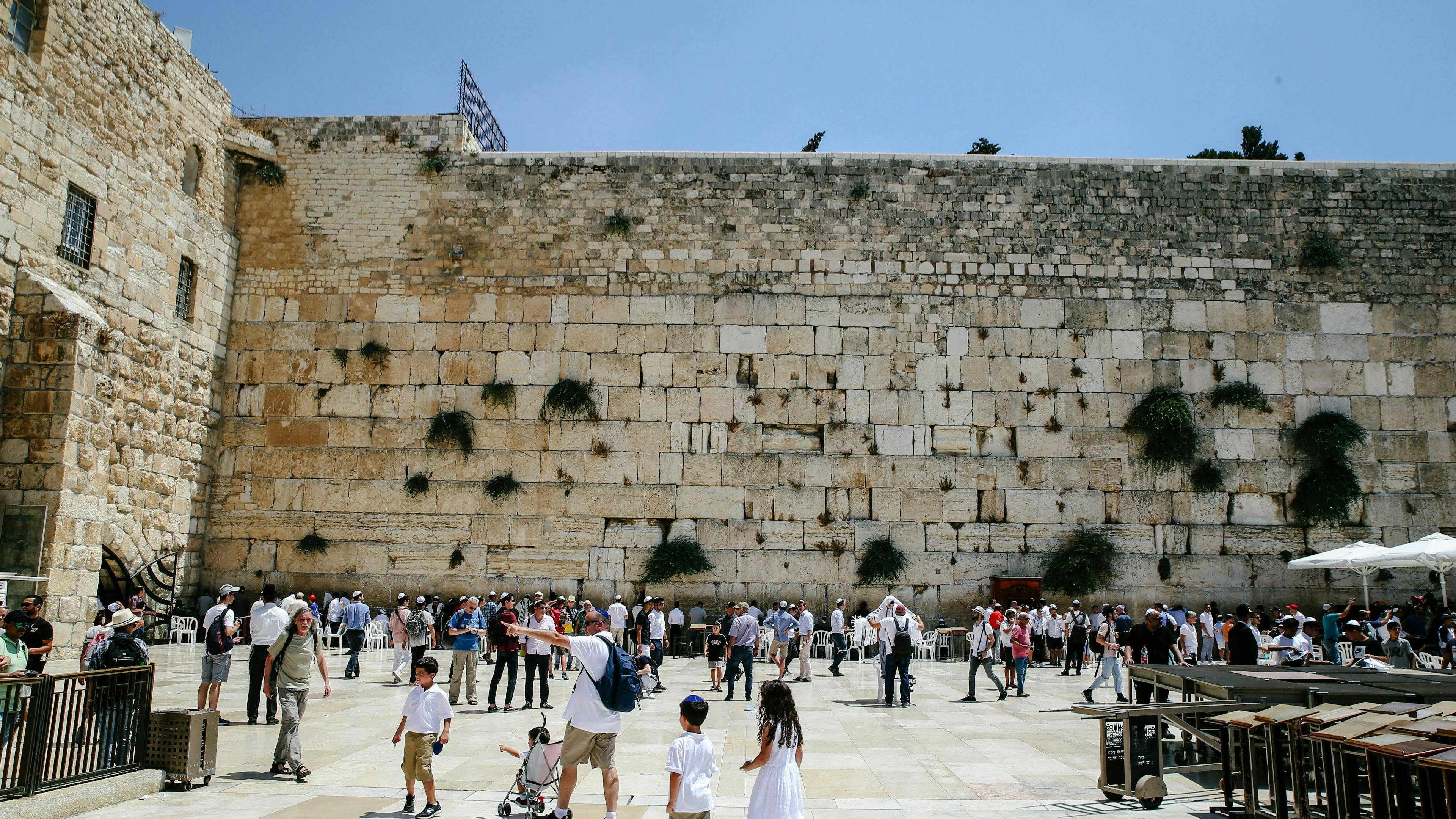As Jews around the world celebrate Sukkot or the Feast of Tabernacles they are no doubt mindful of the protection that the people of Israel experienced in connection with the clouds of glory in the wilderness. For some people the booths or tabernacles are meant to remind us about the clouds of glory that surrounded the people (Leviticus 23:42-43). Rashi and Akiba understood the sukkah as referring to the clouds of glory, while Ibn Ezra understood it as meaning real booths. There was of course a cloud of glory above the Tabernacle itself (Numbers 9:15-23). There is a special sense in which all this speaks of the wonderful blessing of God dwelling with and among His people.
But few realise that this was also speaking of what could be experienced through God’s Messiah the One who is given the name Immanuel (God with us). This is God dwelling in a special way with His people. Imagine the great blessing of experiencing that in a still more wonderful way than the people of Israel knew in the wilderness. How is that possible?
It is because God tabernacled among us men in Jesus Christ: the Son of God who possesses both a divine and a human nature. As we read in John 1:14:
John 1:14
“And the Word was made flesh, and dwelt among us, (and we beheld his glory, the glory as of the only begotten of the Father,) full of grace and truth.”
The word for dwelt in Greek (ἐσκήνωσεν) could be translated tabernacled. Thus the Feast of Tabernacles points towards Jesus Christ. Jesus is the Jewish Messiah prophesied in the Old Testament. How did Jesus Christ fulfill these prophecies?
Jesus fulfilled the lineage of the Messiah
He fulfilled the lineage. Christ – according to his human nature – was born of the Jews, in the royal Davidic line. According to Scripture, Jesus Christ would be born of the seed of Jacob (Genesis 49:10), and also be from the house of David. The promise is made to David in 2 Samuel 7:
2 Samuel 7:
“And when thy days be fulfilled, and thou shalt sleep with thy fathers, I will set up thy seed after thee, which shall proceed out of thy bowels, and I will establish his kingdom [...] And thine house and thy kingdom shall be established for ever before thee: thy throne shall be established for ever.”
Jesus was both matrilineally descended from David, which is proven in Luke 3 by tracing the line of Mary’s father Heli; and also could trace the line of his earthly father Joseph to King David, as demonstrated in Matthew 1 – although of course, Christ was not generated by Joseph, but rather conceived by the Holy Spirit in Mary’s womb. But when the temple records were destroyed in A.D. 70 and its aftermath, it would no longer be possible to prove any Jewish messianic candidate was truly descended from David. Thus we must conclude that the Messiah arrived before A.D. 70 - as Jesus of Nazareth did.
Jesus was born of a virgin, according to Isaiah’s prophecy.
In Isaiah 7:14, it is said:
in Hebrew: הִנֵּה הָעַלְמָה, הָרָה וְיֹלֶדֶת בֵּן. The word עַלְמָה means virgin in the Biblical language of Hebrew, although it is common to see many Jews – and sadly also liberal Christians – claim that עַלְמָה merely means a young woman. They argue actually בְּתוּלָה should be used instead if Isaiah wanted to reference a virgin, but because Isaiah used עַלְמָה, a virgin isn't necessarily implied – so the logic goes.
The truth though is that עַלְמָה does mean virgin. It comes from the root עלם, (alam), meaning to hide – and this makes sense, as a virgin would be hidden from the public due to shame and modesty in Biblical times. The connection between the word עַלְמָה who is closed and hidden from a man, and the root word עלם meaning closed and hidden, is natural and logical.
Rashi says on Isaiah 7:14 that Isaiah meant: "אשתי הרה השנה הזאת והיא היתה שנת ד' לאחז
but this is untrue, because an עַלְמָה cannot be an אִשָּׁה or wife. If it did naturally translate to such, Rashi would have easily been able to make reference to it – but the words are lacking, and the translation is forced.
Rabbi David Kimchi, in his commentary on Isaiah, claims that עלמה may or may not mean a virgin. Yet in his Sefer HaShorashim (or Book of Hebrew Roots), he claims that the almah cannot be a virgin because Proverbs 30:20 references an adulterous woman, whereas Proverbs 30:19 references the almah, therefore the almah must be adulterous.
Proverbs 30:18-19 reads:
Proverbs 30:18-19
There be three things which are too wonderful for me, yea, four which I know not: The way of an eagle in the air; the way of a serpent upon a rock; the way of a ship in the midst of the sea; and the way of a man with a maid.”
The point of Proverbs 30:19 rather is that a man will seek to deflower a virgin עַלְמָה, and this is wicked – he is compared here to a serpent, as he seeks to allure the woman into illicit relations, bringing to mind how the snake sought to tempt the woman in the garden. So clearly, עַלְמָה is a virgin.
So Kimchi, in order to deny the obvious meaning of the almah as a virgin, has to make the virgin of Proverbs 30:19 a non-virgin, which ruins the point of the passage, in which the wicked, plotting man is compared to a serpent, and ruins innocence.
Kimchi himself in the same book sees the connection between the almah and the root ayin-lamed-mem (עלם), showing several verses in which עלם is used to convey a sense of hiding, such as Leviticus 4:13, Nahum 3:11, Job 28:21, and Obadiah 1:16. And yet he won't make the obvious connection to virginity because of the obvious fulfilment in Jesus Christ, which would destroy Kimchi's rabbinic Judaism.
Jesus died an atoning death before the destruction of the temple in A.D. 70, according to the prophecy of Daniel
Daniel says by the Holy Spirit that:
These 70 weeks equate to 70 times seven years, or 490 years. 483 of these years occur before Christ’s public ministry, which begins the 70th week. In this time, both Jerusalem and its temple were rebuilt – as we read of in Ezra and Nehemiah. Herod beautified this second temple. Daniel 9:24 speaks of an "everlasting righteousness" being brought in. Only Christ can bring everlasting righteousness, and this is achieved through justification by faith. God graciously gifts the sinner faith in Christ.
In verse 26, we learn that the Messiah will be:
Thus the death of Christ is prophesied as occurring in the A.D. 30s, which is precisely what happened. This is strengthened and clarified in Isaiah’s prophecy in Isaiah 53:5:
Isaiah 53:5
“But he was wounded for our transgressions, he was bruised for our iniquities: the chastisement of our peace was upon him; and with his stripes we are healed.”
We then look briefly into a further future event, the Romans ("the people of the prince that shall come") destroying the temple in a war. This is not said to occur during the 70th week, only some time after Messiah being cut off.
Verse 27 refers back to Christ's death in the middle of the 70th week, and his confirmation of a covenant with many. Who are these many? The Father (Isaiah 42:6) says of Christ that he will
Isaiah 42:6
"give thee for a covenant of the people, for a light of the Gentiles" (Gentiles being many nations) to make the blind see and set the prisoners free"
we also see in Isaiah 61, which Christ preached in Luke 4. In Isaiah 55:1-3, a covenant is established with all who thirst, and those who labor, ("I will make an everlasting covenant with you" v.3) - a passage Jesus refers to in John 7:37 and Matthew 11:28.
The confirming of the covenant refers to Christ's public ministry in which he preached the verses above, referencing back to the covenant with the thirsty and the laboring. This confirmation lasts for half a week, before Messiah is cut off. This is when Jesus was crucified 3 or so years after he began his public ministry.
The sacrifice and oblation are caused to cease by Jesus, signified in Scripture by the veil of the Temple being torn in two (Matthew 27:51) and explained in Hebrews 10:5-22. Note the "he" in Daniel 9:27 refers to the previous subject, the Messiah. The reference is not the prince, because the prince is not previously considered the subject of the clause - rather "the people of the prince" are referred to in verse 26.
What Jesus achieved spiritually through his own death, bringing an end to the significance of the sacrifices, he achieved materially by using the Roman armies ("the instruments of this destruction", as Matthew Henry puts it) to physically destroy the temple. We see in Scripture repeatedly how God can bring foreign nations in warfare against Israel as a temporal judgment - this occurs in Jeremiah, for example.
Jesus was raised to life on the third day
We know that the Messiah would be raised to life from Psalm 16:10
Psalm 16:10
“For thou wilt not leave my soul in Sheol; neither wilt thou suffer thine Holy One to see corruption.”
But while David himself did die, the holy one, his seed, was not left in the grave: sheol meaning both hell, and in this context, the grave, where the dead lay. Yet Jesus was raised to life on the third day by the power of God.
We know that this would specifically occur on the third day, from Hosea 6:2:
Hosea 6:2
“After two days will he revive us: in the third day he will raise us up, and we shall live in his sight.”
This life is the spiritual life we now have in Christ, and was only possible because God raised Jesus bodily as the Jewish Messiah. We also see the resurrection indicated in Isaiah 53:10:
All of these Scripture passages come together beautifully in Jesus, the God-man, born of the Jews in Bethlehem in Judah, from the royal line of David, who died as atonement for our sins, bearing the punishment for our sins; his righteousness imputed to us by God. He had a public ministry of three years in which he confirmed God’s covenant, and was cut off by crucifixion, yet raised to life by God after three days, in the 70th week of Daniel (c. A.D. 33). You must repent of your sins and have faith in Jesus, believing the gospel, for there is no other way to God but through Jesus Christ, who declared truly:
And when we have come to God through Jesus Christ we experience that true dwelling with us and in us.
More Topics
You might alsoo be interested in these topics.




